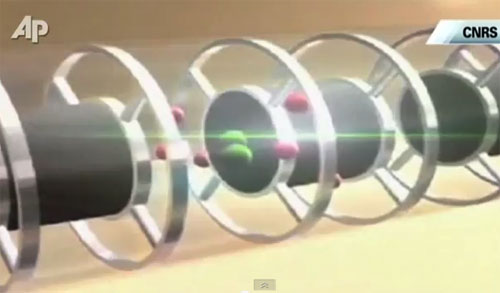Redo the experiment 'faster than light'
After announcing neutrinos move faster than light last month, physicists from the European Atomic Research Organization (CERN) decided to repeat the experiment in a different way to verify the results.
>>> For the first time observing Earth neutrinos
>>> Detecting particles moving "faster than light"
Last month physicists of the European Atomic Research Organization (CERN) fired 15,000 streams of neutrino particles with a large particle accelerator from Geneva to the Gran Sasso laboratory in Italy. The distance from the firing point of neutrino particles to their destination is 732 km. In the process of measuring the velocity of neutrino streams, a physicist accidentally found their speed to be 60 billionths of a second higher than the speed of light.

Experimental image of neutrinos moving faster than light
>>> Watch Video
Yesterday CERN announced they would repeat the experiment of firing neutrinos to verify its velocity.
This time, the physics team shot protons, not neutrinos, with a large particle accelerator. After a series of complex interactions, neutrinos are generated from the flow of protons and pierce through the earth's crust to reach the Gran Sasso.
' In the past few days we have fired a stream of particles from Geneva to Gran Sasso. That will allow physicists to repeat measurements, eliminating systematic mistakes that may arise , "said Dr. Sergio Bertolucci, CERN's research director.
Mr. Bertolucci said that re-experimenting is necessary due to the importance of detection. It will quell criticism and allow physicists to analyze test results before being publicly available.
The speed of light (299,792 km / sec) is considered to be the speed limit in the universe. In the special theory of relativity (or special relativity), published in 1905, Albert Einstein said that no matter in the universe could move faster than the speed of light (299,792 km / s). ) in a vacuum environment.
Many leading scientists in the world are skeptical of CERN's discovery, because Einstein's doctrine has stood for hundreds of years. For them, the most ' easy to hear ' explanation is a systematic mistake that skewed the results of measuring neutrino velocity.
- Video: Redo the experiment 'faster than light'
- Conclusion about super particles 'faster than light'
- Officially reject particles faster than light
- Can move faster than light?
- For the first time, the scene broke the wall of light
- Operated by light, computer speed is 20 times faster
- Detecting moving particles 'faster than light'
- The ability of humans to fly to the Moon ... faster than light
- The most horrifying psychological experiment in history
- The neutrinos move faster than the speed of light
- Light granular or waveform?
- The strange energy beam moves faster than the speed of light
 'Fine laughs' - Scary and painful torture in ancient times
'Fine laughs' - Scary and painful torture in ancient times The sequence of numbers 142857 of the Egyptian pyramids is known as the strangest number in the world - Why?
The sequence of numbers 142857 of the Egyptian pyramids is known as the strangest number in the world - Why? History of the iron
History of the iron What is alum?
What is alum?